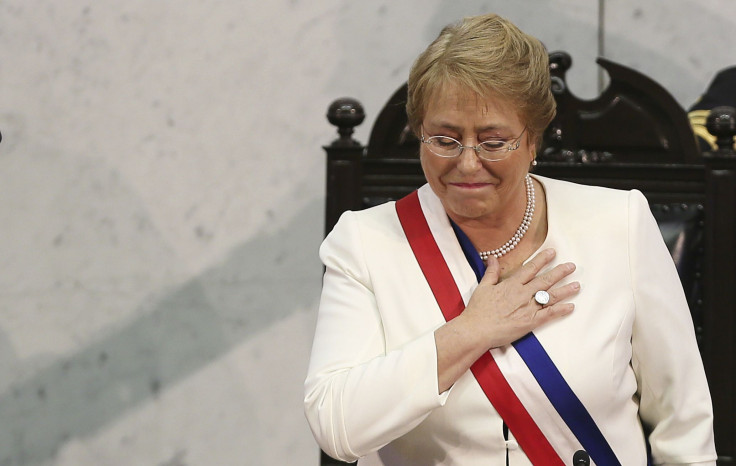Chile's President Michelle Bachelet Approval Sinks Over Economic Malaise, Corruption And Stalled Reforms

Chile’s President Michelle Bachelet, leader of the country that has for years upheld a sterling reputation as South America’s most stable and prosperous democracy, is now facing a grim turnaround in her presidency. Two years after she soared to re-election in a landslide vote, her approval rating stands at a historic low of 20 percent, according to a survey released this week by Chilean opinion pollster Plaza Pública Cadem.
Bachelet’s slump is the latest indicator of a wider malaise that has crept up on the country, the world's largest exporter of copper, over the past year. Chile has long been Latin America’s model democracy, exhibiting rapid economic growth and lacking any of the political turmoil that has beset neighbors like Argentina or Venezuela. But high-profile corruption scandals and a sluggish economic recovery tied to China's slowdown have dogged Bachelet’s government. Public confidence in her administration has also faltered badly over what critics say are overly ambitious constitutional, labor, tax and education reform plans that haven’t delivered. With all these problems afoot, some analysts say it may already be too late for Bachelet to recover trust in the second half of her presidency.
“She’s already a lame duck,” said Patricio Navia, a Chilean assistant professor of Latin American and Caribbean Studies at New York University. “I don’t see how she can move out from the difficult predicament she’s under.”
Bachelet, a center-left politician who served her first presidential term from 2006-2010, clinched re-election in 2013 with 68 percent of the vote. She came into office in 2014 with a pledge to target endemic inequality in Chile by passing a set of reforms that would produce a new constitution, strengthen labor unions’ power, make university education free and implement a new tax system to fund the initiatives. Analysts say if passed, the reform package would represent some of the most sweeping and transformative structural changes in decades.
But nearly two years later the administration has scaled back or stalled on some of those plans. The tax reform program, which was aimed at boosting government revenues by 3 percent of gross domestic product by 2018, is still awaiting a slate of additional amendments in Congress despite expectations it would begin implementation this year. Bachelet also pledged to begin a process to draft a new constitution in September to move away from its current version, originally produced during the country’s military dictatorship from 1973-1990, but it hasn’t moved forward. Meanwhile, the president’s landmark labor reform plan, which would streamline the process for employees to join unions and enhance their collective bargaining power, is facing fierce opposition from business groups, while students have criticized delays in passing education measures that would eliminate tuition from Chile’s universities.
President Michelle Bachelet Approval (blue) and disapproval (red). pic.twitter.com/ybiFzEqTX9
— Claudio SilvaAravena (@casacl) May 6, 2015
“Some people who were strongly in support of [Bachelet] expected her to deliver things much more quickly than she has,” Navia said. “She came to power promising too much. She raised expectations to a point that was not healthy.”
Bachelet’s government has also been mired in a series of corruption scandals, the most serious of which involved her son, Sebastian Davalos. Prosecutors are conducting an investigation into whether he misused his proximity to power to get a preferential loan for his wife’s real estate business. The accusations, which came out in February, badly accelerated frustrations over Bachelet’s presidency and prompted her to deflect rumors that she would have to resign.
All this came to light against an economy bruised by a global slowdown. Chile, like many of its South American neighbors, rode a wave of high commodity prices and Chinese demand for raw materials that plumped up its annual economic growth rates to 6 percent or 7 percent in the early 2000s. But demand from China has waned in recent years, stemming in part from a cooling real estate bubble. Chile, which garners half of its export revenue from copper, felt the pinch: Copper prices have fallen by about half since peaking in February 2011, down to around $2.50 per pound from $4 per pound. Chile’s economy expanded by just 1.9 percent in 2014, a five-year-low, with a modest recovery of 2.2 percent growth projected for this year.
“Had copper been $4.00 and not $2.50, [the fallout] would have been another story,” said Marta Lagos, founding director of Latinobarometro Corporation, a nonprofit opinion research group based in Providencia, Chile. Opposition groups, including monied elites threatened by reforms like the proposed labor laws, had effectively seized on the economic troubles to exacerbate the public’s negative views of the government, she said.
It’s still unclear what Bachelet’s continually sinking approval numbers will bring to bear on her landmark reform program, but Lagos said the president would likely power through with it, regardless of the toll on her reputation. “I dare say she couldn’t care less what her approval rating is,” she said. “I think she’s willing to take as many hits as necessary to pass the reforms.”
© Copyright IBTimes 2024. All rights reserved.












